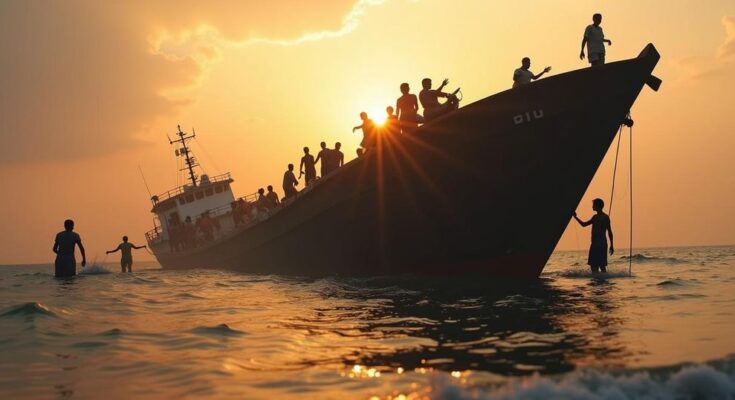A tragic boating accident in Niger State, Nigeria, has resulted in 14 deaths and approximately 150 individuals missing after a boat capsized on the River Niger. Overloading, unsafe travel conditions, and inadequate safety measures have been cited as the leading causes of this disaster. Rescue efforts continue as authorities urge for better enforcement of safety regulations and public education on boating safety.
Tragedy struck in central Niger State, Nigeria, where a devastating boating accident occurred on Tuesday night, resulting in 14 confirmed fatalities and approximately 150 individuals reported missing. The accident transpired when a boat, carrying nearly 300 passengers returning from a religious ceremony in the Mundi community, capsized in the River Niger. Authorities have indicated that overloading was a major factor contributing to this disaster, with some boats often overloaded beyond safe limits. Zainab Sulaiman, the Niger State emergency coordinator, stated, “Right now, there are 14 corpses that have been recovered, and the local divers are still in the water right now.” Rescue efforts are actively ongoing in search of additional survivors; around 150 passengers have reportedly been rescued, but many remain unaccounted for. Boat accidents are prevalent in Nigeria, primarily due to the inadequate enforcement of safety regulations, including restrictions on load limits and the mandatory use of life jackets. Tragically, many in rural communities lack awareness regarding these safety measures, leading to dangerous travel conditions on the nation’s waterways. An anonymous local official remarked, “As far as I’m concerned, there’s no one using life jackets in Niger State. You know, these are rural areas; they don’t even know what life jackets are all about.” Further complicating the issue, climate change has exacerbated water levels, contributing to an increase in flooding risks following recent heavy rains and the release of water from neighboring Cameroon’s Lagdo Dam. The situation necessitates immediate action, as observed by emergency officials who advocate for enhanced law enforcement to ensure compliance with safety regulations, stating, “The regulatory authorities should start to enforce these laws. If they need to send officers there at the boarding point, it will go a long way.” This incident is a stark reminder of the urgent need for improved safety measures and public awareness regarding water travel regulations in Nigeria.
The topic of boating accidents in Nigeria is critical, as it highlights the challenges faced by rural communities in adhering to safety regulations. This incident exemplifies the persistent issues of overloading, inadequate safety measures, and insufficient governmental oversight, which contribute to frequent maritime tragedies. With a historical context of such accidents being frequent in Nigeria, it raises questions regarding effective policy implementation and public education on safety precautions in water travel.
In conclusion, the recent boating accident in Niger State underscores the dangers posed by overloading and the lack of safety enforcement in Nigeria’s waterways. With 14 confirmed deaths and numerous individuals unaccounted for, this tragedy calls for urgent reforms in safety regulations and increased educational efforts targeting rural populations about the importance of adhering to boating laws and safety protocols. Furthermore, addressing the implications of climate change and its contribution to rising water levels remains essential for preventing future tragedies.
Original Source: www.voanews.com




